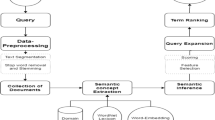Abstract
In this paper, we present an efficient semantic query expansion methodology based on a question concept list comprised of terms that are semantically close to concepts represented in a query. The proposed system first constructs a concept list for each question concept and then learns the concept list for each question concept. When a new query is given, the question is classified into the question concept, and the query is expanded using the concept list of the classified concept. In the question answering experiments on 42,654 Wall Street Journal documents of the TREC collection, the traditional system showed in 0.223 in MRR and the proposed system showed 0.50 superior to the traditional question answering system.
Preview
Unable to display preview. Download preview PDF.
Similar content being viewed by others
References
Cardie, C., Ng, V., Pierce, D., Buckley, C.: Examining the Role of Statistical and Linguistic Knowledge Sources in a General-Knowledge Question-Answering System. In: Proceeding of the 6th Applied Natural Language Processing Conference, pp. 180–187 (2000)
Hovy, E., et al.: Learning Surface Text Patterns for a Question Answering system. In: Proceedings of the ACL conference, pp. 180–187 (2002)
Kazawa, H., Hirao, T., Isozaki, H., Maeda, E.: A machine learning approach for QA and Novelty Tracks: NTT system description. In: Procs. of the 11th Text Retrieval Conf. (2003)
Prager, J., Radev, D., Brown, E., Coden, A.: The Use of Predictive Annotation for Question-Answering in TREC8. In: Proceedings of the TREC-8 Conference NIST, pp. 309–316 (2000)
Author information
Authors and Affiliations
Editor information
Editors and Affiliations
Rights and permissions
Copyright information
© 2005 Springer-Verlag Berlin Heidelberg
About this paper
Cite this paper
Kim, HJ., Bu, KD., Kim, J., Lee, SJ. (2005). Exploiting Question Concepts for Query Expansion. In: Gelbukh, A. (eds) Computational Linguistics and Intelligent Text Processing. CICLing 2005. Lecture Notes in Computer Science, vol 3406. Springer, Berlin, Heidelberg. https://doi.org/10.1007/978-3-540-30586-6_68
Download citation
DOI: https://doi.org/10.1007/978-3-540-30586-6_68
Publisher Name: Springer, Berlin, Heidelberg
Print ISBN: 978-3-540-24523-0
Online ISBN: 978-3-540-30586-6
eBook Packages: Computer ScienceComputer Science (R0)




